| Article ID | Journal | Published Year | Pages | File Type |
|---|---|---|---|---|
| 1116324 | Procedia - Social and Behavioral Sciences | 2014 | 11 Pages |
There is a growing interest in entrepreneurship education expressed by politicians, higher education institutions and students. Entrepreneurship education has been shown to contribute to the development of students’ entrepreneurial intentions, although the findings are not entirely conclusive. The theoretical foundation of the current paper was the theory of planned behavior, TPB (Ajzen, 1991, 2005). The aim of the study was to identify the content of university entrepreneurship education and its impact for students’ entrepreneurial intentions. The study design used was cross-sectional study and the sample consisted of the students from 17 European countries that have been grouped for the purpose of analysis by the level of economic development into two country groups: efficiency-driven and innovation-driven economies (Porter et al., 2002). Frequencies and binary logistic regression was used to analyze the impact of different factors, including participation in entrepreneurship education, for entrepreneurial intentions. Results indicate that what is offered is not necessarily the most demanded in entrepreneurship education as lectures and seminars are provided more, but networking and coaching activities are expected more by the students. Participation in entrepreneurship education was found to exert positive impact on entrepreneurial intentions.
